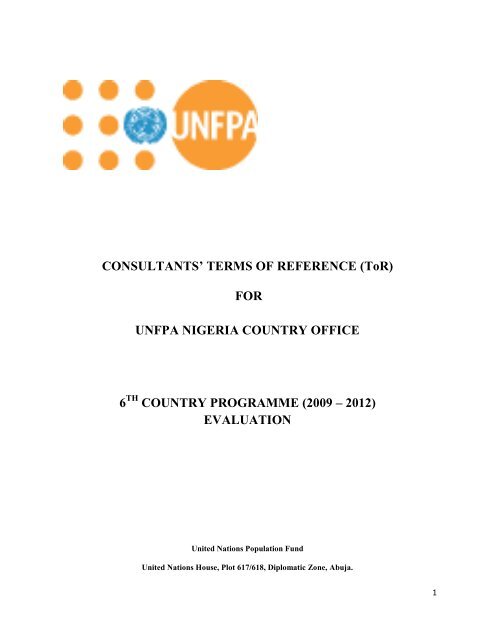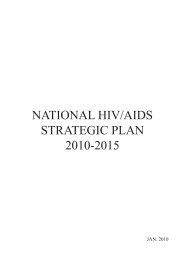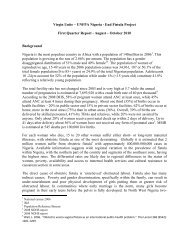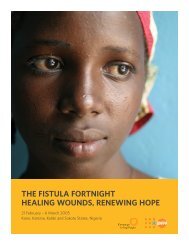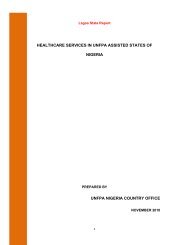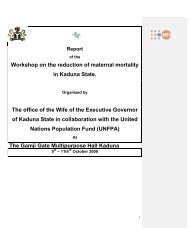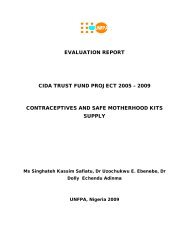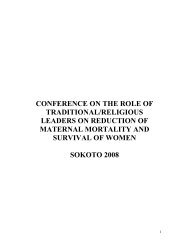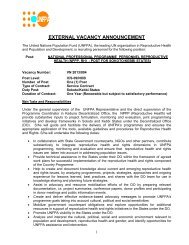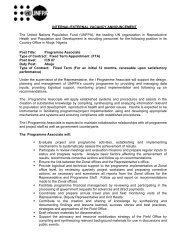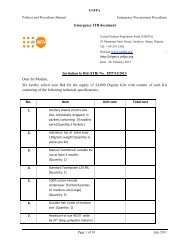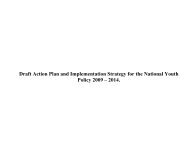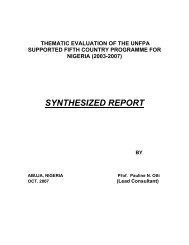CONSULTANTS' TERMS OF REFERENCE (ToR ... - UNFPA Nigeria
CONSULTANTS' TERMS OF REFERENCE (ToR ... - UNFPA Nigeria
CONSULTANTS' TERMS OF REFERENCE (ToR ... - UNFPA Nigeria
Create successful ePaper yourself
Turn your PDF publications into a flip-book with our unique Google optimized e-Paper software.
CONSULTANTS’ <strong>TERMS</strong> <strong>OF</strong> <strong>REFERENCE</strong> (<strong>ToR</strong>)FOR<strong>UNFPA</strong> NIGERIA COUNTRY <strong>OF</strong>FICE6 TH COUNTRY PROGRAMME (2009 – 2012)EVALUATIONUnited Nations Population FundUnited Nations House, Plot 617/618, Diplomatic Zone, Abuja.1
1. INTRODUCTIONThe United Nations Population Fund (<strong>UNFPA</strong>) has been operational in <strong>Nigeria</strong> since 1973 and iscurrently in its 6 th Country Programme (CP) cycle of providing development assistance to theGovernment and people of <strong>Nigeria</strong>. The 6 th CP, spanning 2009 – 2012, contributes to themandate of <strong>UNFPA</strong> as stated in the Global <strong>UNFPA</strong> Strategic Plan (2008-2013), through thethree thematic areas of Reproductive Health and Rights (RHR), Population and Development(PD), as well as Gender Equality (GE). The 6 th Country Programme hitherto designed to end in2012 was extended to 2013 to align with the time-span of the United Nations DevelopmentAssistance Framework (UNDAF II) in-country, and the Global <strong>UNFPA</strong> Strategic Plan. The goalof the 6 th Country programme is to improve the standard of living of the people of <strong>Nigeria</strong> withthe following priority areas: a) improving access to high quality reproductive health and HIVprevention services b) increasing availability and utilization of gender disaggregated sociodemographicdata; c) promoting gender equity, equality and empowerment of women.<strong>UNFPA</strong>’s goals are:• Population and Development: To ensure a systematic use of population dynamicsanalysis in order to guide increased investments in reproductive health andHIV/AIDS; gender equality; youth development, in view of improving quality of life,sustainable development and poverty reduction.• Reproductive Health and Rights: To improve quality of life by way of universalaccess to reproductive health by 2015 and universal access to comprehensive HIVprevention by 2010.• Gender Equality: To advance gender equality and empowerment of women andadolescent girls to exercise their human rights, particularly their reproductive rights,and live free of discrimination and violence.2. BACKGROUND AND CONTEXTThe population of <strong>Nigeria</strong> is estimated at about 166 million in 2011, with the male and femalepopulation constituting 51% and 49% respectively 1 . With a land area of less than 0.2% of theworld, <strong>Nigeria</strong>’s population is one of the ten largest globally and a major contributor to theestimated 7 billion population of the world in 2011. The high population growth rate has beenidentified as a major contributor to the low (0.453) Human Development Index. Thus while thecountry pursues its policies of industrialization and economic growth, equal attention is expectedto be paid to reproductive health and rights including family planning, young people and genderequality and equity. <strong>UNFPA</strong> has worked over the years with the Government of <strong>Nigeria</strong> toimprove the lives of all peoples in the country in the course of 5 country programs prior to theindex Country Program with an estimated expenditure of USD$185 million across the 6 countryprograms. The 5 th Country Program re-enforced the efforts of the previous CPs by focusing onthe four thematic areas of Advocacy, Reproductive Health, Population and DevelopmentStrategies and a Gender thematic area.2
However, the 6 th Country Programme takes into consideration the demographic and developmentindices of <strong>Nigeria</strong> and responds to national priorities and aspirations as articulated in the Vision20: 2020 Economic Transformation Blueprint and its component sector development plans. Italso builds on commitments outlined in the United Nations Development Assistance Framework(UNDAF) II, serving as one of the coherence streams by which the UN system in <strong>Nigeria</strong>“Delivers as One”. The Country Program Action Plan (CPAP) 2009-2012 was approved in 2008and implementation of activities under the plan commenced in 2009. The Program focused onthe three thematic areas in the <strong>UNFPA</strong> Global Strategy: i. Reproductive Health and Rights; ii.Population and Development; and iii. Gender Equality and Women Empowerment. The 6 thCountry Program with an estimated budget of US$61 million covered approximately one-third ofall the states in <strong>Nigeria</strong> and the FCT cutting across all the 6 geo-political zones with an estimatedcombined population of about 60 million people. Program implementation was in 12+1 statesincluding Sokoto, Kebbi and Kaduna in the North West, Borno and Adamawa in the North East,Benue and the FCT in the North Central, Lagos and Ogun in the South West, Imo, Abia andEbonyi in the South East with Akwa Ibom in the South - South zone.3. PURPOSE AND SCOPE <strong>OF</strong> THE EVALUATIONThe broader aim of the evaluation is to generate a usable evaluation report that would aid theinherent culture of accountability in the <strong>UNFPA</strong> programming processes in terms of progressmade towards the attainment of the main Outcomes and Outputs of the 6 th Country Program,provide relevant information and strategic recommendations that would support the <strong>Nigeria</strong>Country Office in the development of its 7 th Country Programme in a timely and most effectivemanner. These recommendations will aim to improve the strategies, implementation mechanism,and management efficiency of the next Country program. The Evaluation exercise will cover thecurrent lifespan of the 6 th CP from 2009 to 2012 and will holistically review and systematicallyanalyze recorded achievements and the accompanied strategies and how all these aided thecountry office in delivering on the corporate mandate of <strong>UNFPA</strong> through its contribution to theoutcomes contained in the Global <strong>UNFPA</strong> Strategic Plan.In particular, the evaluation will:Assess the progress or lack thereof, towards the expected outcomes envisaged in the <strong>UNFPA</strong>programming documents. Where appropriate, the evaluation will also highlight unexpectedresults (positive or negative) and missed opportunities;Provide an analysis of how <strong>UNFPA</strong> has positioned itself to add value in response to nationalneeds and changes in the national development context;Present key findings, draw key lessons, and provide a set of clear and forward-lookingoptions leading to strategic and actionable recommendations for the next Programming cycle.4. EVALUATION QUESTIONS AND EVALUATION CRITERIAThis Country Programme Evaluation will have 2 components, (i) the analysis of the focus areas,and (ii) the analysis of the strategic positioning of <strong>UNFPA</strong> <strong>Nigeria</strong> Country Programme. To3
define the broad aspects of the country programme that will be assessed in the analysis of thefocus areas and in the analysis of the strategic positioning a series of evaluation criteria will beapplied to these 2 components and would constitute the framework used to formulate theevaluation questions.Component 1: Analysis of the Focus Areasa) Relevance of the 6 th Country Programme: Assess the degree to which the CP result statements were relevant in relation to Global<strong>UNFPA</strong> priorities, i.e. MYFF, International Conference on Population and Development(ICPD), the Millennium Summit Declaration, the World Summit on MDG (2005), Paris andAccra Declaration and <strong>UNFPA</strong> Strategic plan; To what extent is <strong>UNFPA</strong> support to <strong>Nigeria</strong> aligned to the objectives in the NationalDevelopment Plan (2010-2014) and the “Vision 20:2020” and responding to the nationalpriorities? Is the strategy appropriate vis-à-vis the needs as expressed in the NDP and the Vision20:2020 documents? To what extent is the <strong>UNFPA</strong> support in the field of reproductive health (i) adapted to theneeds of the population (ii) and in line with the priorities set by national policy frameworks? A realistic analysis of the country situation, including political, social and economicalanalysis; to what extent were the external risks (i.e. political, governance, conflict andfiduciary) and the internal threats to the programme implementation identified? Assess to what extent the 6 th CP incorporated gender-sensitive and human rights-basedapproaches:a. Did the programme identify HR claims and obligations of rights holders and dutybearers?b. Were capacity building strategies based on capacity gaps of rights holders and dutybearers?a. To what extent were gender, social inclusion and youth integrated across theprogramme?b. To what extent were rights holders and duty bearers participating in the design,planning, implementation, monitoring and evaluation of programme activities?b) Effectiveness of the 6 th Country Programme: To what extent were the expected outputs of the CPAP achieved or are likely to be achievedthrough the events and activities implemented in the 6 th CP? Was there sufficient synergy among the various programme components? Did other projectscontribute to and reinforce achievement of programme results? To what extent were the monitoring, evaluation, reporting and accountability systemsadequate to enable <strong>UNFPA</strong> to demonstrate programme results? To what extent were these systems adequately used to adjust programme strategies tochanging policy and programme contexts and needs in the course of programmeimplementation? How well has <strong>UNFPA</strong> communicated its results/lessons learnt/good practices?4
c) Efficiency of the 6th Country Programme: Was <strong>UNFPA</strong>’s actual expenditure in line with expectations and plans? Were there anysignificant changes or delays? Was the skill mix and continuity of staff appropriate to the country context and strategy? Was the time of <strong>UNFPA</strong> staff spent (i.e. policy dialogue vs. technical assistance; projectwork vs. administration) efficiently? To what extent was the geographic programme coverage cost-effective? To what extent were the results of monitoring missions, reviews and evaluations used toreconsider design/direction of work and resourcing and staff allocation priorities? To what extent were the adopted execution modalities appropriate? How has <strong>UNFPA</strong> been effectively working together with other UN partners in the country?d) Sustainability of the 6th Country Programme: Did the <strong>UNFPA</strong> programme incorporate adequate exit strategies and capacity developmentmeasures to ensure sustainability of the results over time? How was <strong>UNFPA</strong>’s Humanitarian response linked to its development assistance? Are conditions and mechanisms in place so that the benefits of <strong>UNFPA</strong> interventions aresustained and owned by commissions, institutions and stakeholders at the national and subnationallevels after the interventions in all three mandate areas are completed? What could have been done within the timeframe of the CPAP additionally to improve thelikelihood of positive long-term effects and reduce the likelihood of negative long-termeffects?e) Status of planned results of the 6 th Country Programme: What is the current status of the CP6 indicators? What has been the trend of these indicators? Given the past trend and present situation, what are the opportunities to improve thestatus of these indicators and what are the risks that need to be taking into account?Component 2: The analysis of the strategic positioning of <strong>UNFPA</strong> <strong>Nigeria</strong> in the CountryThe strategic positioning of the Country Office will be assessed in two dimensions (Internal andExternal) based on its Alignment with wider UN strategic frameworks and the added value<strong>UNFPA</strong> contributes among the country development partners in view of responding towardschanges in the country’s needs and priorities. The evaluation will analyze a core set of criteriarelated to the strategic positioning of <strong>UNFPA</strong> as shown below.a) Strategic Alignment: To what extent is the Country programme aligned with <strong>UNFPA</strong> Strategic Plan? How the programme is aligned with the <strong>UNFPA</strong> strategic and accountabilityframeworks? How has <strong>UNFPA</strong> been effectively working together with other UN partners in thecountry?b) Responsiveness:5
To what extend did the programme anticipate and respond to significant changes in thenational development context within its 3 core focus areas? What were the missedopportunities in <strong>UNFPA</strong> programming?c. Added Value:To what extent did the country programme add value to national efforts in the threepriority areas of <strong>UNFPA</strong>’s work in the country?5. EVALUATION METHODOLOGY AND APPROACHData CollectionIn terms of data collection, the evaluation will use a multiple method approach that will includedocument reviews, group and individual interviews and field visits as appropriate.Final methods to be selected must match the above stated objectives and specific questions. It isexpected that the technical proposal will:a) Identify methodology and sample (please address sampling limitations)b) Level of stakeholders’ participation amongst other issuesValidationThe Evaluation Team will use a variety of methods to ensure that the data is valid, includingtriangulation.Stakeholders’ InvolvementAn inclusive approach, involving a broad range of partners and stakeholders, will be taken. Theevaluation will have a process of stakeholders mapping in order to identify both <strong>UNFPA</strong> directpartners as well as stakeholders who do not work directly with <strong>UNFPA</strong>, yet play a key role in arelevant outcome or thematic area in the national context. These stakeholders may includerepresentatives from the economic, social and political commissions and institutions,Governments at all levels, civil-society organizations, the private-sector, UN organizations, othermultilateral organizations, bilateral donors, and most importantly, the beneficiaries of theprogramme.6. THE EVALUATION PROCESSThe process of the evaluation will be divided into four phases, each including several steps.Phase 1: Preparation and Desk Phase:Desk review – This phase will encompass preparatory work by the Country Office, incollaboration with the sub regional and regional offices (identification, collection and mapping6
of relevant documentation and other data), the evaluation team will analyze all documents relatedto the country programme over the period under review 2009 - 2012.Stakeholder mapping – A simple mapping of stakeholders relevant to the evaluation will bedeveloped by the evaluation team. The product of the mapping will include national institutionsand civil-society stakeholders. It will go beyond the traditional partners in the country and willalso indicate the relationships among the different sets of stakeholders.Development of an operational/logistical plan - The evaluation team in consultation with theteam of advisers and operations manager at the Country Office will develop evaluationoperational/logistical plan and calendar, to address logistical issues related to the assessment andrelated field visits. Output: Inception Report – A desk report will be prepared by the team containing at theminimum the evaluation design, which will include the stakeholders mapping, the evaluationquestions and methodologies to be adopted, sources of information and plan for datacollection, including selection of project/field sites for visits, and design for data analysis.Phase 2: Data Collection PhaseData collection – A mission of a flexible duration will be embarked on to the Country Office andits Decentralized and Liaison Offices including offices of its Implementing Partners by theevaluation team to:Clarify the understanding of the <strong>Nigeria</strong> country office development challenges with keystakeholders including the government and their view on the part <strong>UNFPA</strong> can play in addressingthe challenges that fall within the organizations mandate areas.Better understand the <strong>Nigeria</strong> Country programme and activities by further interaction with theDCOs in Abia and Kaduna; this will include visit to the Liaison Office in Lagos and the officesof Implementing Partners in the <strong>UNFPA</strong> supported states as the case may be.The team will in the process also gather additional information necessary to enrich the evaluationprocess and its outcome.At the end of this phase, the evaluation team will provide a debriefing of the preliminary findingsto the management and staff of the Country Office, take initial comments and validate thepreliminary findings.Phase 3: Drafting the Evaluation ReportA draft evaluation report will be prepared by the evaluation team within 4 weeks after the datacollection exercise and the visits to the <strong>UNFPA</strong> offices in country. The draft report will besubmitted by the Team Leader to the Resident Representative, <strong>UNFPA</strong> <strong>Nigeria</strong> Country Office.7
Review and Quality Assurance – The draft report shall be shared with a designated qualityassurance team (e.g. the Regional M&E Advisor, Evaluation Management Committee,designated individual etc) who will subject it to a formal review process. The Team Leader willbe directly responsible for addressing any comments or observations towards eventualfinalization of the report.Presentation of findings, Validation and submission of reportThe Evaluation team shall present the draft and final versions of the report to the Country OfficeResident Representative, <strong>UNFPA</strong> staff members and relevant stakeholders in designatedmeetings. The exact medium for the presentation would be determined in conjunction with theEvaluation team. The final copy of the report will be submitted to the <strong>UNFPA</strong> Country OfficeResident Representative.Phase 4: Follow-upManagement Response – the country office will prepare a management response to theevaluation recommendations in the final evaluation report in line with <strong>UNFPA</strong> evaluationprocedures.Dissemination The final version of the evaluation report will be disseminated at appropriate fora.It will be widely distributed to all relevant stakeholders in country and within <strong>UNFPA</strong>. It willalso be submitted to the <strong>UNFPA</strong> Executive Board in company of the new Country Programme.7. EXPECTED OUTPUTS/DELIVERABLESAn analytical evaluation report providing quantitative and qualitative analysis on progress andthe Country Office’s achievements during the 4 year period as well as evidence based clearrecommendations for the country programme shall be produced. An outline of the report will bedeveloped and shared with the evaluation reference group. The Evaluation Team under theleadership of the Evaluation Team Leader shall be responsible for the production and submissionof the final report and all other outputs expected in the course of the evaluation process. TheCountry Office will not proceed to pay the consultants until the Evaluation Team Leader hasapproved the contribution of the team members and the overall deliverables have been certifiedby the Country Office Evaluation Manager.These deliverables will include the following documents:• The Evaluation Desk Report: This will be a 10-15 page document and will consist ofthe following sections: a. Stakeholder map b. Evaluation matrix including evaluationquestions, codification, indicators, data collection methods, sources of information; c)overall evaluation design and methodology; d) description of data gaps and needs for8
further in country data collection, including techniques and tools to be used (focusgroups, survey etc.).• A Power Point presentation containing the main findings, conclusions andrecommendations of the evaluation for dissemination and debriefing purposes• Comprehensive Final Evaluation Report.8. TIMEFRAME AND EVALUATION WORKPLANThe evaluation shall be conducted over a period of seven (7) weeks. However, the process beginsfrom March, 2012 and should terminate in November 2012 with the submission of the finalevaluation report to the Resident Representative and Senior Management. The Evaluation teamworking with the Evaluation Manager with inputs from the Reference Group (EvaluationManagement Committee) will develop a detailed work plan possibly in a Gantt chart that showseach activity to be embarked upon and dates for important milestones towards the submission ofthe Final Evaluation Report. The table below shows a tentative timeframe and key milestones forthe consultancy process and the roles of the Consultants.Phases: Role of the Responsible persons ScheduleDesk Layout of the method guide prepared and agreedcustomized to <strong>UNFPA</strong> decentralized countryprogramme evaluations Initial Research and analysis of <strong>Nigeria</strong>documentation and data Identification of existingevaluative evidence and potential constraints (lackof records, institutional memory, paucity ofevaluations, etc.) Analysis of the logic of <strong>UNFPA</strong>’s interventionsin <strong>Nigeria</strong> on the basis of a number of documentsand the preparation of the desk report (includingevaluation matrix (evaluation criteria, evaluationquestions, indicators methods of data collectionand sources)Field Implementation of the evaluation work plan fordata collection in the respective focus areas plusgender equality and the start ofassumptions/hypothesis testing using theevaluation matrix. Utilization of a multiple method approach for datacollection that includes document reviews, focusgroup discussion and individual interviews andproject/field visits. The team will usetriangulation as a central method, drawinginformation from multiple sources. Consultants (P&D,Gender, and RH) underthe leadership of theTeam Leader withsupport from the Country OfficeEvaluation Manager and RM&E Advisor ARO andSROThe Consultants under thecoordination of the TeamLeaderThe Consultants under thecoordination of the TeamLeaderJune/JulyJulyAugust9
SynthesisReporting• The drafting of the evaluation report. The finalreport shall include findings and conclusionsresponding to the evaluation questions/ criteria aswell as an overall assessment. The report willalso include recommendations Review of the methodological guide vis-àvisthe draft report to ensure quality andadherence to stated procedures Make input to the draft towards finalizationof the reportThe Consultants under thecoordination of the TeamLeader Country OfficeEvaluation Manager Regional M&EAdvisor, AfricaRegional Office SROAugust/September/OctoberAugust/September/October9. COMPOSITION <strong>OF</strong> THE EVALUATION TEAM AND RESPONSIBILITIES<strong>UNFPA</strong> will engage a three-man team of independent consultants recruitedinternationally/nationally and charged with the responsibility of preparing the Country Briefand/or other technical papers as may be required. The consultants will be responsible for thethree core programme components of <strong>UNFPA</strong>, namely: Population and Development/M&E(International), Reproductive Health (National), Gender Equality & Women Empowerment(National).The P&D consultant will play the lead role and will therefore coordinate the activities of his/herco-consultants and assess the extent to which the various outputs contribute in meeting the aimsof the <strong>UNFPA</strong>-supported Country Programme as they relate to the ICPD and ICPD+5 goals andthe MDGs. For reasons of clarity and better understanding, the lead consultant will produce amatrix illustrating to what extent the component project outputs have contributed to meeting theoutcomes of the programme components and the goal of the country programme. He/she willcoordinate the inputs of co-consultants as well as write the Country Brief. <strong>UNFPA</strong> will identifythe lead consultant.Specific Tasks for the ConsultantsConsultant for Population and Development/M&E (International):PHASE IThe activities in Phase I will take place in Abuja. They will consist of the following:Briefing of the P&D consultant by <strong>UNFPA</strong>, NPopC and NPC staffDesk study of relevant background materials/documentationDiscussion with <strong>UNFPA</strong>/ NPopC and NPC staff and clarification of issues arising fromdesk study of background materials/documentsPHASE II10
The activities in Phase II will include undertaking missions to component programmesites and interacting with selected stakeholders (NPopC, NPC, Project Managers,beneficiaries, CSOs, etc) at various levels (Federal, State and LGA). In this connection,the consultant’s task is to:Undertake an analytical review of the direction of the Government’s programme and ofchanges in Government policies, priorities and programmes with implications for<strong>UNFPA</strong> sponsored assistance, including multi-lateral funding with a focus on Populationand Development Component;Analytically review the achievement of the <strong>UNFPA</strong> supported country programmeoutputs based on the indicators established, identifying key facilitating and limitingfactors with specific regard to Population and Development Component;Undertake a critical analysis of the design, relevance and performance of the CountryProgramme and results of monitoring and evaluation activities, and follow-up actionswith particular reference to linkages within and among the programme components;Analytically review the quality and adequacy of technical assistance provided and itseffectiveness in increasing national capacity in dealing with issues regarding Populationand Development;Review the mechanisms of sustainability ownership of the programme (governmentcommitment, political/financial/community mobilization and participation at all levels,integration of population issues at all levels, etc;Conduct an analysis of the management of the programme including adequacy andappropriateness of execution modalities, coordination mechanisms, andcomplementariness among the programme components;Review the achievements made on Population and Development and its contribution tothe UNDAF outcomes, the ICPD and ICPD+5 goals, and the MDGs;Review other multilateral and bilateral inputs to the Government’s populationprogramme, the portion allotted to P&D issues and an assessment of the coordination ofthe overall inputs in regard to other programme areas;Review the original risks and assumptions and comment on the extent to which they haveinfluenced implementation of the programme;Conduct an overall review of the status of expenditures and allocations of <strong>UNFPA</strong>financial inputs into the programme component;Critically review the actions linked to P&D issues raised during the MTR of the 6 th CP;Identify particular issues of concern in P&D to be addressed during the implementationof the 7 th Country Programme; andMake recommendations on future directions for the programme during the 7 th CountryProgramme.11
Consultant for Reproductive Health (National):PHASE IThe activities in Phase I will take place in Abuja. They will consist of the following: Briefing of the RH consultant by <strong>UNFPA</strong> and FMOH staff Desk study of relevant background materials/documentation (See tentative list ofdocuments) Discussion with <strong>UNFPA</strong>/FMOH staff and clarification of issues arising from desk studyof background materials/documentsPHASE II The activities in Phase II will include undertaking missions to sites of ImplementingPartners of the programme component and interacting with selected stakeholders, (projectmanagers, beneficiaries, Government officials from the Federal and State Ministries ofHealth, NACA, SACA and CSOs such as ARFH and NYNETHA), at the various levels(Federal, State and LGA). In this connection, the consultant’s task is to: Undertake an analytical review of the direction of the Government’s programme and ofchanges in Government policies, priorities and programmes with implications for<strong>UNFPA</strong>-sponsored assistance, including multi-bilateral funding with a sharpened focuson Reproductive Health Services including HIV/AIDS Prevention and RHCS; Analytically review the achievements of the <strong>UNFPA</strong>-supported country programmeoutputs based on the indicators established, identifying key facilitating and limitingfactors with specific regard to the provision of comprehensive and integratedReproductive Health Services including HIV/AIDS Prevention focusing on young peopleand provision of Youth Friendly Services (YFS) and RHCS; Undertake a critical analysis of the design, relevance and performance of the CountryProgramme and results of monitoring and evaluation activities, and follow-up actionswith particular reference to linkages within and among the programme components; Analytically review the quality and adequacy of technical assistance provided and itseffectiveness in increasing national capacity in dealing with Reproductive Health issuesand HIV prevention; Review the mechanisms of sustainability/ownership of the programme (governmentcommitment - political/financial, cost-recovery, community mobilization andparticipation at all levels of the programme, etc.); Conduct an analysis of the management of the programme including adequacy andappropriateness of execution modalities, coordination mechanisms, and complementarilyamong and within programme components; assess the extent to which activities of theRH programme component are complementary and coordinated with those of otherdonors providing support to the national population and reproductive health programme;12
Review the achievements made in dealing with RH issues in <strong>Nigeria</strong> and its contributionin meeting ICPD, ICPD+10 goals and MDGs and recommendations as they relate toICPD, ICPD+10, the MDGs and other agreed national indicators;Review other multilateral and bilateral inputs to the Government’s populationprogramme, the portion allotted to RH issues and assess the coordination of the overallinputs in regard to RH activities;Review the original risks and assumptions and comment on the extent to which they haveinfluenced implementation of the programme;Conduct an overall review of the status of expenditures and allocations of <strong>UNFPA</strong>financial inputs into the outputs on Reproductive Health services, including HIV/AIDSand RHCS;Critically review of actions linked to RH issues raised during the 6 th CP MTR;Identify RH concerns to be addressed, including young people’s needs, during the 7 thCountry Programme implementation; andMake recommendations on future directions for the programme during the 7 th CountryProgramme.Consultant for Gender Equality/Women Empowerment (National):PHASE IThe activities in Phase I will take place in Abuja. They will consist of the following: Briefing of the Gender consultant by <strong>UNFPA</strong> and FMOWA, FMI&C Desk study of relevant background materials/documentation (See tentative list ofdocuments) Discussion with <strong>UNFPA</strong>/ FMOWA, FMI&C, and clarification of issues arising fromdesk study of background materials/documents.PHASE II As part of the process, the consultants are expected to undertake missions to sites ofImplementing Partners of the programme component and interacting with selectedstakeholders, and undertake an analytical review of the direction of the Government’sprogramme and of changes in Government policies, priorities and programmes withimplications for <strong>UNFPA</strong>-sponsored assistance, including multi-bilateral funding with asharpened focus on Gender Equality and Women Empowerment; Analytically review the achievements of the <strong>UNFPA</strong>-supported country programmeoutputs based on the indicators established, identifying key facilitating and limitingfactors with specific regard to Gender Equality and Women Empowerment; Undertake a critical analysis of the design, relevance and performance of the CountryProgramme and results of monitoring and evaluation activities, and follow-up actionswith particular reference to linkages within and among the programme components;13
Analytically review the quality and adequacy of technical assistance provided and itseffectiveness in increasing national capacity in dealing with Gender Equality and WomenEmpowerment;Review the mechanisms of sustainability/ownership of the programme (governmentcommitment - political/financial, cost-recovery, community mobilization andparticipation at all levels of the programme, etc.);Conduct an analysis of the management of the programme including adequacy andappropriateness of execution modalities, coordination mechanisms, andcomplementarities among and within programme components; assess the extent to whichGender Equality and Women Empowerment activities are complementary andcoordinated with those of other donors providing support to the national population andreproductive health programme;Review the achievements made in dealing with Gender Equality and WomenEmpowerment issues in <strong>Nigeria</strong> and its contribution in meeting ICPD, ICPD+5 goals andMDGs and recommendations as they relate to ICPD, ICPD+5 and the MDGs and otheragreed national indicators;Review other multilateral and bilateral inputs to the Government’s populationprogramme, the portion allotted to Gender Equality and Women Empowerment issuesand assess the coordination of the overall inputs in regard to Gender Equality activities;Review the original risks and assumptions and comment on the extent to which they haveinfluenced implementation of the programme;Conduct an overall review of the status of expenditures and allocations of <strong>UNFPA</strong>financial inputs into the outputs on Gender Equality and Women Empowerment;Critically review of actions linked to Gender Equality issues raised during the 6 th CPMTR;Identify Gender Equality and Women Empowerment concerns to be addressed during theduring the 7 th Country Programme implementation; andMake recommendations on future directions for the programme during the 7 th CountryProgramme.Consultants QualificationsEducation:Post-graduate University Degree or equivalent (preferably Ph. D.) in public health, socialscience, demography, gender, economics, international relations, international development,public administration, management or other related fieldKnowledge and Experience:Minimum 10 years of increasingly responsible professional experience, of which five years at theinternational level, and of which five years in health and/or social sciences evaluation; includeperiodic updating of technical skills:14
In-depth knowledge of development issues and challenges, as well as <strong>Nigeria</strong> governmentpolicies, substantive knowledge of population and development programmatic area of<strong>UNFPA</strong> work in the country as well as expertise on national planning processes andnational monitoring and evaluation systems (P&D/M&E)In-depth knowledge of development issues and challenges, as well as <strong>Nigeria</strong> governmentpolicies, substantive knowledge of Reproductive Health\ Maternal Health and genderprogrammatic areas of <strong>UNFPA</strong> work in the country. These are inclusive of themes/issuesrelevant to: Family planning, Human resources in the Health sector, emergency obstetricand newborn care as well as fistula. (RH/Maternal Health Specialist)In-depth knowledge of development issues and challenges, as well as <strong>Nigeria</strong> governmentpolicies, substantive knowledge of Gender Equality and Women Empowermentprogrammatic area of <strong>UNFPA</strong> work in the country as well as expertise on nationalplanning processes (Gender Equality and Women Empowerment Specialist)Proven drafting skills and ability to work in a team.Solid understanding of evaluation methodologies, and/or a proven expertise of research insocial science relevant for the evaluation, in particular national monitoring & evaluationsystems.Demonstrated capacity for strategic thinking and policy advice are essential.Familiarity with <strong>UNFPA</strong> or UN operations will be advantage.Must be able to work in a multidisciplinary team and multicultural environment.Must be committed to respecting deadlines of delivery outputs within the agreed timeframe.Be fluent in English with strong writing skills.10. REMUNERATION AND DURATION <strong>OF</strong> CONTRACTThe duration of the contract will be 45 work days for the Population and Development andM&E Systems Specialist and 35 days for the Reproductive Health/Maternal Health Specialistand for the Gender Equality and Women Empowerment Specialist. The consultancy dayswill be spread between the date of initial engagement and November, 2012 (Table belowrefers).The Consultancy fee will be paid in line with the following schedule and upon acceptance ofkey deliverables: At the end of the Desk Phase: 20% At the submission of the Final Draft Report: 50% At the end of the Evaluation exercise: 30%15
<strong>UNFPA</strong> will cover travel costs related to the consultancy services and pay Daily SubsistenceAllowance (DSA) per night spent on mission embarked upon as part of the EvaluationProcess using <strong>UNFPA</strong> standard DSA rates.Population and Developmentand M&E Systems SpecialistWork daysTentative ScheduleDesk Phase 10 June/JulyField Phase 15 AugustReporting Phase 20 September/October45Reproductive Health/MaternalHealth SpecialistWork daysTentative ScheduleDesk Phase 8 June/JulyField Phase 15 AugustReporting Phase 12 September/October35Gender Equality and WomenEmpowerment SpecialistWork daysTentative ScheduleDesk Phase 8 June/JulyField Phase 15 AugustReporting Phase 12 September/October3511. THE EVALUATION AUDIENCEThe primary audience of this Report of this Evaluation is the <strong>UNFPA</strong> Resident Representative in<strong>Nigeria</strong> along with the in-country senior management team as well as all country office staff. Theevaluation report will be shared with the Sub-Regional Office in Dakar, the Africa RegionalOffice in Johannesburg, Programme Division and Division of Oversight Services at <strong>UNFPA</strong>headquarters. The evaluation report will be made available to <strong>UNFPA</strong> Executive Board by thetime of approving a new Country Programme Document in 2013. The report and themanagement response will be published on the global <strong>UNFPA</strong> website and the <strong>Nigeria</strong>equivalent and would be available to government partners in country and other developmentagencies through established procedures and guidelines.16
Ethical Code of Conduct for UNEG/<strong>UNFPA</strong> EvaluationsEvaluations of <strong>UNFPA</strong>-supported activities need to be independent, impartial and rigorous.Each evaluation should clearly contribute to learning and accountability. Hence evaluators musthave personal and professional integrity and be guided by propriety in the conduct of theirbusiness. Evaluation Team /Evaluators:1. To avoid conflict of interest and undue pressure, evaluators need to be independent, implyingthat members of an evaluation team must not have been directly responsible for thepolicy/programming-setting, design, or overall management of the subject of evaluation, norexpect to be in the near future.Evaluators must have no vested interest and have the full freedom to conduct impartially theirevaluative work, without potential negative effects on their career development. They must beable to express their opinion in a free manner.2. Should protect the anonymity and confidentiality of individual informants. They shouldprovide maximum notice, minimize demands on time, and: respect people’s right not to engage.Evaluators must respect people’s right to provide information in confidence, and must ensurethat sensitive information cannot be traced to its source. Evaluators are not expected to evaluateindividuals, and must balance an evaluation of management functions with this generalprinciple.3. Evaluations sometimes uncover evidence of wrongdoing. Such cases must be reporteddiscreetly to the appropriate investigative body.4. Should be sensitive to beliefs, manners and customs and act with integrity and honesty intheir relations with all stakeholders. In line with the UN Universal Declaration of Human Rights,evaluators must be sensitive to and address issues of discrimination and gender equality. Theyshould avoid offending the dignity and self-respect of those persons with whom they come incontact in the course of the evaluation. Knowing that evaluation might negatively affect theinterests of some stakeholders, evaluators should conduct the evaluation and communicate itspurpose and results in a way that clearly respects the stakeholders‟ dignity and self-worth.5. They are responsible for the clear, accurate and fair written and/or oral presentation of studylimitations, evidence based findings, conclusions and recommendations.For details on the ethics and independence in evaluation, please see UNEG Ethical Guidelinesand Norms for Evaluation in the UN Systemhttp://www.unevaluation.org/search/index.jsp?q=UNEG+Ethical+Guidelineshttp://www.unevaluation.org/papersandpubs/documentdetail.jsp?doc_id=2117
Annexes:Annex I: Inception/Desk Report OutlineCHAPTER 1: INTRODUCTIONCHAPTER 2: COUNTRY CONTEXTCHAPTER 3: UNDAF/ <strong>UNFPA</strong> RESPONSE PROGRAM STRATEGIESCHAPTER 4: EVALUATION METHODOLOGY AND APPROACHCHAPTER 5: EVALUATION PROCESS, ROLES AND RESPONSIBILITIES <strong>OF</strong> THE TEAMMEMBERS AND EVALUATION EXERCISE CALENDARAnnex II: Evaluation Report OutlineEXECUTIVE SUMMARYCHAPTER 1: INTRODUCTIONCHAPTER 2: THE COUNTRY CONTEXTCHAPTER 3: UNITED NATIONS / <strong>UNFPA</strong> RESPONSECHAPTER 4: FOCUS AREA ANALYSISCHAPTER 5: STRATEGIC POSITIONINGCHAPTER 6: CONCLUSIONS AND RECOMMENDATIONSAnnexe(s)METHOD <strong>OF</strong> APPLICATIONIf you are interested to serve as Consultant in any of the positions and meet the requirements,please send a cover letter (one page summary statement that describes how your experienceand qualification relate to the job description) and a scanned/PDF copy of a completed andsigned UN Personal History Form (which can be downloaded from <strong>UNFPA</strong> intra site -http://nigeria.unfpa.org/vacancy.html or a detailed Curriculum Vitae.Applications should be addressed to The <strong>UNFPA</strong> Resident Representative, Abuja andforwarded to the e-mail address - vacancypdu.ng@unfpa.org latest by Thursday, 2818
June, 2012. Each application should clearly reflect the position to which an applicant isapplying as follows:1. Consultant, Population and Development/M & E (International)2. Consultant, Reproductive Health (National)3. Consultant, Gender Equality & Women Empowerment (National)Please note that <strong>UNFPA</strong> will respond only to those applicants in whom it has a furtherinterest. Kindly also note that ONLY applications sent by e-mail will be accepted.Qualified women are encouraged to apply.<strong>UNFPA</strong> – Because everyone countsKINDLY NOTE THAT ONLY APPLICATIONS SENT TO THE DESIGNATED E-MAILTOGETHER WITH DULY CONMPLETED UN PERSONAL HISTORY FORM WILL BEACCEPTED19


